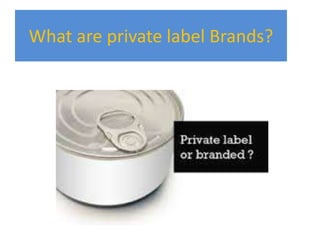What are private label brands ?
•Télécharger en tant que PPTX, PDF•
5 j'aime•6,192 vues
Private Label brands, future of private label brands.
Signaler
Partager
Signaler
Partager

Contenu connexe
Tendances
Tendances (20)
Topic sales promotion sales promotion mix kinds of promotion

Topic sales promotion sales promotion mix kinds of promotion
unit 2 Retail Models & Theories of Retail Development.pptx

unit 2 Retail Models & Theories of Retail Development.pptx
Similaire à What are private label brands ?
Similaire à What are private label brands ? (20)
Do private labels represent a sustainable branding strategy

Do private labels represent a sustainable branding strategy
Analysis brands versus private labels- fighting to win 

Analysis brands versus private labels- fighting to win
Plus de Sameer Mathur
Plus de Sameer Mathur (20)
A brand is forever ! A framework for Revitalizing Declining and Dead brands

A brand is forever ! A framework for Revitalizing Declining and Dead brands
What is an integrated marketing communications program?

What is an integrated marketing communications program?
What are the major steps in developing effective communications?

What are the major steps in developing effective communications?
What is communication mix and how should it be set

What is communication mix and how should it be set
What are the major steps in developing effective communication

What are the major steps in developing effective communication
Dernier
W.H.Bender Quote 61 -Influential restaurant and food service industry network...

W.H.Bender Quote 61 -Influential restaurant and food service industry network...William (Bill) H. Bender, FCSI
Dernier (20)
Press Release Distribution Evolving with Digital Trends.pdf

Press Release Distribution Evolving with Digital Trends.pdf
Aligarh Hire 💕 8250092165 Young and Hot Call Girls Service Agency Escorts

Aligarh Hire 💕 8250092165 Young and Hot Call Girls Service Agency Escorts
HOW TO HANDLE SALES OBJECTIONS | SELLING AND NEGOTIATION

HOW TO HANDLE SALES OBJECTIONS | SELLING AND NEGOTIATION
The 9th May Incident in Pakistan A Turning Point in History.pptx

The 9th May Incident in Pakistan A Turning Point in History.pptx
Rise and fall of Kulula.com, an airline won consumers by different marketing ...

Rise and fall of Kulula.com, an airline won consumers by different marketing ...
Enhancing Business Visibility PR Firms in San Francisco

Enhancing Business Visibility PR Firms in San Francisco
W.H.Bender Quote 61 -Influential restaurant and food service industry network...

W.H.Bender Quote 61 -Influential restaurant and food service industry network...
Unveiling the Legacy of the Rosetta stone A Key to Ancient Knowledge.pptx

Unveiling the Legacy of the Rosetta stone A Key to Ancient Knowledge.pptx
Distribution Ad Platform_ The Role of Distribution Ad Network.pdf

Distribution Ad Platform_ The Role of Distribution Ad Network.pdf
What are private label brands ?
- 1. What are private label Brands?
- 2. Contents: 1) What are private label brands 2) Intermediaries sponsoring their own brand 3) Brands vs private label brands 4) Advantage of private label brands 5) Demand for private label brands 6) Future of these brands
- 3. Private Label Brands A private label brand (also called as reseller, store, house, or distributor brand)is a brand that retailers and wholesalers develop. Walmart’s “great value” is an example.
- 4. Private Label Brands Some More Examples: (Pantaloons Retail)
- 5. Why do Intermediaries sponsor their own brand? Having their own brand can be profitable. Intermediaries search for manufactures with excess capacity that will produce private label goods at low cost.
- 6. Intermediaries own Brand Other costs such as research and development advertising, sales promotion, and physical distribution, are also much lower, so private labels can generate higher profit margin.
- 7. Brands vs Private Label brands Branded(Johnsons) Private Label (Walmart)
- 8. Brands vs Private Label Brands
- 9. Brand Label of Big Bazaar
- 11. Advantages of Private Label Brands There are various advantages for the retailers to go for private label brands; Control over pricing of the product/service. Put forth own idea’s on marketing plans. Create personalized image which in turn leads to higher customer loyalty.
- 12. Advantages of Private Label Brands Higher control on production, marketing, distribution and profits, give their own inputs, additional materials, logos, tags etc. Customers changing preference- drive towards private label products.
- 14. Future of Private Label Brand National results were analysed in comparison to worldwide trends, which indicate that over 68% of the world believe private label to be a good alternative to branded products.
- 15. Future of Private Label Brand Global Studies also point to the fact that certain regions have reached saturation in their Private label reach. 75% of categories worldwide include private label offerings. these product hold an average value share of 15%.
- 16. Disclaimer: Prepared by: Sitanshu Gandhi, SIT Pune. During an Internship by Prof. Mathur, IIM Lucknow. www.IIMInternship.com
